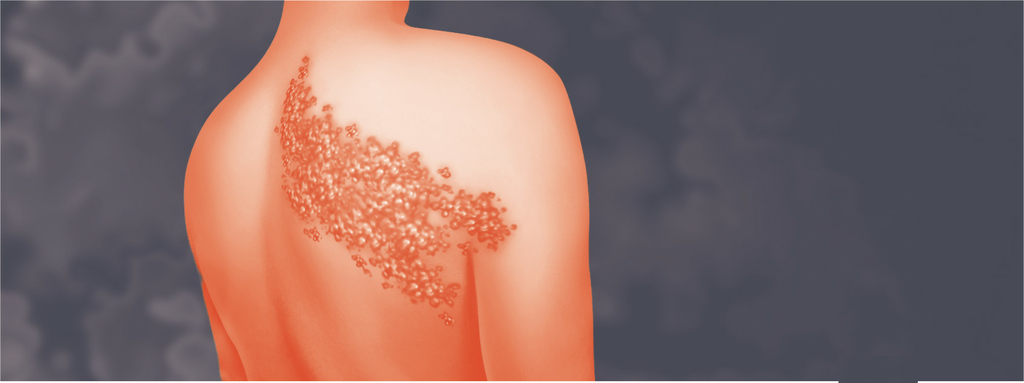
Als ons lichaam wordt getroffen door een infectie of als we gewond raken, reageert ons afweersysteem hierop door middel van een acute ontstekingsreactie. Maar in veel gevallen blijft een ontsteking in het lichaam langer aanwezig. Dit kan gevolgen hebben voor de lange termijn gezondheid. Het risico op ziektes als dementie, diabetes, obesitas, hartklachten en kanker neemt erdoor toe. Maar het heeft ook invloed op onze huid. In dit artikel wordt ingegaan op chronische inflammatie van de huid en de rol van voeding als onderdeel van de behandeling van diverse huidindicaties.
Beste bezoeker, u heeft geen toegang.
Enkel (web)abonnees hebben toegang tot tijdschriftartikelen. Het webabonnement is nog in de maak.
U kunt zich wel alvast (gratis) registreren en tal van andere webartikelen raadplegen!
Auteur
Trefwoorden:
Verschenen in
Referenties
- Scott A, Khan KM, Roberts CR, et al. What do we mean by the term "inflammation"? A contemporary basic science update for sports medicine. Br J Sports Med. 2004;38(3):372-380.
- Calder PC. Polyunsaturated fatty acids and inflammation. Prostaglandins Leukot Essent Fatty Acids. 2006;75(3):197-202.
- Libby P. Inflammatory mechanisms: the molecular basis of inflammation and disease. Nutr Rev. 2007;65(12 Pt 2):S140-S146.
- Soehnlein O. Direct and alternative antimicrobial mechanisms of neutrophil-derived granule proteins. J Mol Med (Berl). 2009;87(12):1157-1164.
- Feghali CA, Wright TM. Cytokines in acute and chronic inflammation. Front Biosci. 1997;2:d12-d26. Published 1997 Jan 1.
- Bian XW, Chen JH, Jiang XF, et al. Angiogenesis as an immunopharmacologic target in inflammation and cancer [published correction appears in Int Immunopharmacol. 2005 Mar;5(3):627]. Int Immunopharmacol. 2004;4(12):1537-1547.
- Medzhitov R. Origin and physiological roles of inflammation. Nature. 2008;454(7203):428-435.
- Yamagishi S, Matsui T, Fukami K. Role of receptor for advanced glycation end products (RAGE) and its ligands in cancer risk. Rejuvenation Res. 2015;18(1):48-56.
- Danby FW. Nutrition and aging skin: sugar and glycation. Clin Dermatol. 2010;28(4):409-411.
- Nguyen HP, Katta R. Sugar Sag: Glycation and the Role of Diet in Aging Skin. Skin Therapy Lett. 2015;20(6):1-5.
- Meksiarun P, Maeda Y, Hiroi T, et al. Analysis of the effects of dietary fat on body and skin lipids of hamsters by Raman spectroscopy. Analyst. 2015;140(12):4238-4244.
- Rosa DF, Sarandy MM, Novaes RD, et al. High-Fat Diet and Alcohol Intake Promotes Inflammation and Impairs Skin Wound Healing in Wistar Rats. Mediators Inflamm. 2018;2018:4658583. Published 2018 Jul 24.
- Vaid M, Singh T, Prasad R, et al. Intake of high-fat diet stimulates the risk of ultraviolet radiation-induced skin tumors and malignant progression of papillomas to carcinoma in SKH-1 hairless mice. Toxicol Appl Pharmacol. 2014;274(1):147-155.
- Herbert D, Franz S, Popkova Y, et al. High-Fat Diet Exacerbates Early Psoriatic Skin Inflammation Independent of Obesity: Saturated Fatty Acids as Key Players. J Invest Dermatol. 2018;138(9):1999-2009.
- Esposito K, Nappo F, Marfella R, et al. Inflammatory cytokine concentrations are acutely increased by hyperglycemia in humans: role of oxidative stress. Circulation. 2002;106(16):2067-2072.
- Toshitani A, Ansel JC, Chan SC, et al. Increased interleukin 6 production by T cells derived from patients with atopic dermatitis. J Invest Dermatol. 1993;100(3):299-304.
- Amarbayasgalan T, Takahashi H, Dekio I, et al. Interleukin-8 content in the stratum corneum as an indicator of the severity of inflammation in the lesions of atopic dermatitis. Int Arch Allergy Immunol. 2013;160(1):63-74.
- González O, Tobia C, Ebersole J, et al. Caloric restriction and chronic inflammatory diseases. Oral Dis. 2012;18(1):16-31.
- Charo IF, Taub R. “Anti-inflammatory therapeutics for the treatment of atherosclerosis.” Nature reviews. Drug discovery vol. 10,5 (2011): 365-76.
- Schütte O, Bachmann L, Shivappa N, et al. Pro-inflammatory Diet Pictured in Children With Atopic Dermatitis or Food Allergy: Nutritional Data of the LiNA Cohort. Front Nutr. 2022;9:868872. Published 2022 Apr 8.
- Phan C, Touvier M, Kesse-Guyot E, et al. Association Between Mediterranean Anti-inflammatory Dietary Profile and Severity of Psoriasis: Results From the NutriNet-Santé Cohort. JAMA Dermatol. 2018;154(9):1017-1024.
- Pappas A, Fantasia J, Chen T. Age and ethnic variations in sebaceous lipids. Dermatoendocrinol. 2013;5(2):319-324.
- Meksiarun P, Maeda Y, Hiroi T, et al. Analysis of the effects of dietary fat on body and skin lipids of hamsters by Raman spectroscopy. Analyst. 2015;140(12):4238-4244.
- Horrobin DF. Essential fatty acids in clinical dermatology. J Am Acad Dermatol. 1989;20(6):1045-1053.
- Balić A, Vlašić D, Žužul K, et al. Omega-3 Versus Omega-6 Polyunsaturated Fatty Acids in the Prevention and Treatment of Inflammatory Skin Diseases. Int J Mol Sci. 2020;21(3):741. Published 2020 Jan 23.
- Ishihara T, Yoshida M, Arita M. Omega-3 fatty acid-derived mediators that control inflammation and tissue homeostasis. Vol. 31, International Immunology. Oxford University Press; 2019. p. 559–67.
- Mayser P, Mayer K, Mahloudjian M, et al. A double-blind, randomized, placebo-controlled trial of n-3 versus n-6 fatty acid-based lipid infusion in atopic dermatitis. Journal of Parenteral and Enteral Nutrition. 2002 May 1;26(3):151–8.
- Soyland E, Funk J, Rajka G, et al. Dietary supplementation with very long-chain n-3 fatty acids in patients with atopic dermatitis. A double-blind, multicentre study. British Journal of Dermatology. 1994 Jun 1;130(6):757–64.
- Koch C, Dölle S, Metzger M, et al. Docosahexaenoic acid (DHA) supplementation in atopic eczema: a randomized, double-blind, controlled trial. British Journal of Dermatology. 2008 Apr 1;158(4):786–92.
- Liao Y, Xie B, Zhang H, et al. Efficacy of omega3 PUFAs in depression: A meta-analysis. Translational Psychiatry. 2019;9(1):190.
- Hu Y, Hu FB, Manson JAE. Marine Omega-3 Supplementation and Cardiovascular Disease: An Updated Meta-Analysis of 13 Randomized Controlled Trials Involving 127 477 Participants. Vol. 8, Journal of the American Heart Association. American Heart Association Inc.; 2019.
- D’Angelo S, Motti ML, Meccariello R. ω-3 and ω-6 Polyunsaturated Fatty Acids, Obesity and Cancer. Vol. 12, Nutrients. MDPI AG; 2020. p. 1–22.
- Marton LT, Goulart R de A, Carvalho ACA de, et al. Omega fatty acids and inflammatory bowel diseases: An overview. Vol. 20, International Journal of Molecular Sciences. MDPI AG; 2019.
- Ajabnoor SM, Thorpe G, Abdelhamid A, et al. Long-term effects of increasing omega-3, omega-6 and total polyunsaturated fats on inflammatory bowel disease and markers of inflammation: a systematic review and meta-analysis of randomized controlled trials. European Journal of Nutrition. 2021;60(5):2293–316.
- Fu Y, Wang Y, Gao H, et al. Associations among Dietary Omega-3 Polyunsaturated Fatty Acids, the Gut Microbiota, and Intestinal Immunity. Wu M, editor. Mediators of Inflammation. 2021;2021:8879227.
- Balkrishna A, Nain P, Chauhan A, et al. Super Critical Fluid Extracted Fatty Acids from Withania somnifera Seeds Repair Psoriasis-Like Skin Lesions and Attenuate Pro-Inflammatory Cytokines (TNF-α and IL-6) Release. Biomolecules. 2020;10(2):185. Published 2020 Jan 25.
- Rahman K. Studies on free radicals, antioxidants, and co-factors. Clin Interv Aging. 2007;2(2):219-236.
- Mason RS, Reichrath J. Sunlight vitamin D and skin cancer. Anticancer Agents Med Chem. 2013;13(1):83-97.
- Ellison DL, Moran HR. Vitamin D: Vitamin or Hormone? Vol. 56, Nursing Clinics of North America. W.B. Saunders; 2021. p. 47–57.
- Roider E, Ruzicka T, Schauber J. Vitamin D, the Cutaneous Barrier, Antimicrobial Peptides and Allergies: Is There a Link? Vol. 5, Allergy, Asthma and Immunology Research. 2013. p. 119–28.
- Hollams EM. Vitamin D and atopy and asthma phenotypes in children. Current Opinion in Allergy and Clinical Immunology. 2012;12(3).
- Salem I, Ramser A, Isham N, et al. The gut microbiome as a major regulator of the gut-skin axis. Frontiers in Microbiology. 2018. 9:1459.
- Fang Z, Lu W, Zhao J, et al. Probiotics modulate the gut microbiota composition and immune responses in patients with atopic dermatitis: a pilot study. European Journal of Nutrition. 2020 Aug 1;59(5):2119–30.





